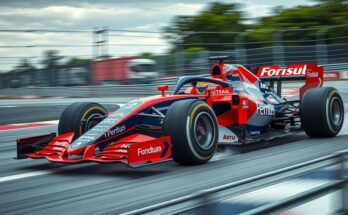Uzbekistan has seen a long-standing dominance of Chevrolet vehicles, comprising 90% of the market. However, the electric vehicle revolution, led by Chinese manufacturers, presents a significant challenge to this monopoly. Following reforms under President Mirziyoyev, the market is now open, leading to increased competition and diversity. Despite skepticism about EV maintenance and pricing, the landscape is shifting as consumer preferences evolve and the government responds with new regulations.
In Uzbekistan, the prevalence of Chevrolet vehicles has been a defining feature of the automotive landscape for over two decades, with about 90% of cars being Chevrolets and 80% painted white. However, this dominance may face significant challenges as the global electric vehicle (EV) revolution progresses and Chinese manufacturers set their sights on the Uzbek market.
Historically, under the leadership of Islam Karimov, Uzbekistan heavily regulated its auto industry, favoring domestic production. In 1996, a deal with South Korea’s Daewoo led to the establishment of the country’s first auto factory, which General Motors later acquired, continuing to produce vehicles under the Chevrolet brand. This arrangement ultimately ensured job creation and formed the backbone of the local automotive industry.
The landscape began to shift following Karimov’s death in 2016, as President Shavkat Mirziyoyev embraced market reforms, resulting in the introduction of various international automotive brands, including those from China. Notably, in 2019, import duties on EVs were abolished, paving the way for significant collaboration between UzAuto Motors and Chinese firms like BYD, which has helped establish production facilities.
By 2024, statistics indicate that out of 482,000 car sales, 353,730 were Chevrolet models, supplemented by nearly 50,000 domestically produced vehicles, mainly from Kia and BYD. Consumers now enjoy a wider array of options, with reports of even Porsche entering the market. Despite this diversity, Chevrolet’s strong presence remains evident, particularly in rural areas like Andijan, where 95.5% of surveyed vehicles were Chevrolet.
A prevalent factor in Chevrolet’s durability is the availability of spare parts and knowledgeable mechanics who specialize in these vehicles. While some consumers express interest in electric cars, there are concerns regarding their cost and maintenance. Nonetheless, experts indicate a gradual shift in consumer attitudes towards EVs, anticipating infrastructure improvements will lower costs and increase the market’s responsiveness to electric vehicle needs.
Chevrolet is currently facing challenges, as its product lineup has diminished, with popular models being discontinued and only a few remaining popular with consumers. In response to market competition, the Uzbek government has enacted non-tariff barriers and new regulations designed to protect local manufacturing yet remains sluggish in adapting to rapidly evolving market dynamics and the influx of Chinese EVs.
While the automotive market in Uzbekistan is shifting towards more diverse offerings, the dominance of Chevrolet is being challenged. As the industry adapts to new consumer preferences and technologies, traditional automotive practices may undergo profound changes.
In summary, the automotive sector in Uzbekistan is experiencing a significant transformation. Chevrolet’s historical dominance is being tested by the emergence of Chinese electric vehicle manufacturers and changing consumer preferences. While challenges remain, such as the need for affordable electric cars and robust servicing options, the market is gradually adapting. Government policies, while aimed at protecting domestic production, must also respond to the competitive landscape shaped by international brands. The future of Uzbekistan’s auto industry undoubtedly points towards increased diversity and choice for consumers, driven by evolving market dynamics.
Original Source: timesca.com




